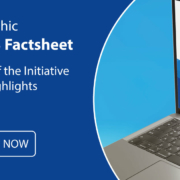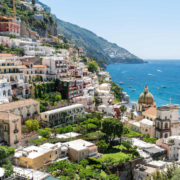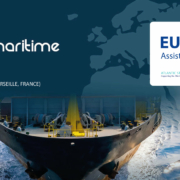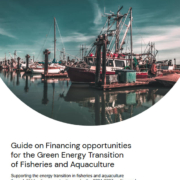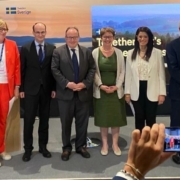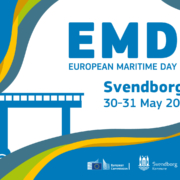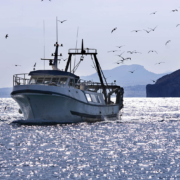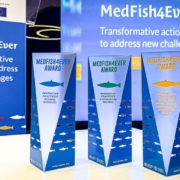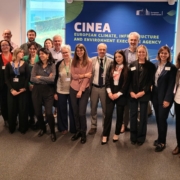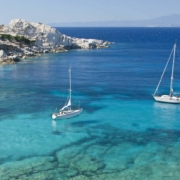The popularity of the Mediterranean sea and its coastal regions amongst tourists remains at an all time high. After a temporary covid dip, the latest figures show that numbers of tourists have already reached pre-pandemic levels and are further on the rise.
Traditional model no longer viable
Traditional ‘sun, sea and sand’ tourism has resulted in improved livelihoods for many local communities, averaging 11.5% of total employment in Mediterranean countries. It is therefore, one of the leading sectors of the economy in the region.
At the same time, it also puts tremendous pressure on the environment. Mass tourism is one of the main causes of increased pollution and a driver for uncontrolled building along the coastlines. This, coupled to a growing demand for water, food and energy and the structurally rising temperatures (sea and land), severely impacts the region’s resources, and is therefore not viable in the long run.
Additionally, these same pressures lower the attractiveness of tourist destinations in the Mediterranean.
Sustainable blue economy at the heart
The European Commission is actively addressing many of these issues to safeguard the connection between economic welfare and the environment with the ‘Sustainable blue economy’ concept.
This has been an ongoing process since 2013 – as part of the Commission’s targeted approach for several European Sea basins with dedicated blue strategies for the Atlantic (Atlantic Action Plan), the Black Sea (Common Maritime Agenda) and the Western Mediterranean (WestMED Initiative).
Flagship projects lead the way
In 2021 the European Maritime, Fisheries and Aquaculture Fund (EMFAF) decided to fund so-called flagship projects (pilot strategic initiatives) for each of the sea basin strategies with 5.5 million euro to accelerate achievement of their respective goals.
For the Western Mediterranean the main objective of this EMFAF flagship funding was to ‘strengthen the competitiveness and sustainability of the coastal and maritime tourism sector, as part of a smart and resilient blue economy – one of the key goals of the WestMED Initiative. This, by preserving the marine and coastal environment as well as marine cultural heritage, and contributing to the attractiveness of coastal areas by means of ecotourism, digitalisation and mobilising private-public investments.’
Eco-tourism, cross-border cooperation and multiplying results
Given the fact that tourism plays such a significant role in the Western Mediterranean as one of the key contributors to both the upside gains as well as the downside risks of the blue economy, three projects that function as a catalyst for change, were selected for co-financing.
All three are focused on enhancing eco-tourism in the region, cross-border cooperation (including non-EU WestMED countries as partners such as Morocco, Tunisia, Algeria and Mauritania) and actively sharing knowledge amongst stakeholders from both the northern and southern shore, to multiply results.
These projects are also examples of the rapid development and transformation of the tourism industry to a more modern sector by adopting digital platforms, digital marketing and information technologies such as the internet of things, augmented reality and virtual reality.
The three Flagship projects:
ECO-CRUISING FU_TOUR
This project boosts new managerial, blue, green and digital skills to pave the way for an eco-friendly, zero-impact cruising sector.
The project designs innovative, sustainable and smart theme-based cruising packages targeting Millennials and Gen Z, aimed at minimising the impact of large groups of visitors.
The project also develops and delivers a specialised capacity building programme, enabling cross-border cooperation, exchange of good practices and unlocking new business opportunities around the eco-cruise sector.
The target group consists of small and medium sized companies in the West Mediterranean area, as well public and private stakeholders in charge of the promotion of EU and West European coastal and maritime destinations.
According to project coordinator Marika Mazzi Boém from X23, the company leading the project, the timing after Covid is critical for the cruise industry to reinvent itself:
“Rather than focusing on strategies to grow tourism, what we need now is to implement actions for containing mass tourism in favour of sustainability. So innovation is key at different levels: in technology, to increase environmentally friendly practises and reduce carbon footprint; in the travel experience, as personalization is a must; and in business modeling, to bring tangible economic and social benefits to local communities”.
EU WeMED_NaTOUR
This project supports local tourism SMEs and involves them in the creation and delivery of eco-tourism packages targeting the growing school-trip tourism market.
It will do so, by creating immersive ‘learning by visiting’ school trips for the ‘new generations’: primary and secondary school students in three age ranges; 6-10 years, 11-13 years, and 14-16.
Schooltrip tourism is beneficial as it not only helps to reduce seasonal peaks but also diversifies the market, increasing awareness of the value and vulnerability of Western Mediterranean marine ecosystems, coastal destinations and culture.
Claudia Iglesias, Project Design and Policy Specialist from X23 is clear on the benefits of this approach:
“Benefits will go two ways: children will have the opportunity to learn, by visiting beautiful landscapes and to contribute preserving the fragile and unique ecosystems; and local tourism SMEs will be actively involved at destination, crucial players to the new value chain that we want to create”.
REBOOT MED
REBOOT MED (Recovering, Experiencing and Boosting eco-tourism in the WestMed area) is a project that encourages public-private partnership, co-defining Blue Economy Action Plans for the Recovery of the tourism sector, and to incubate, accelerate and test eco/blue economy tourism products and packages in Mauritania, Tunisia, Morocco, Spain, Italy and France.
This is done by engaging local multi-stakeholder clusters that have been created in 6 WestMed countries and 10 pilot areas as well as accompanying ecotourism ideas to be tested in real conditions.
Tommaso Scavone, project designer and project manager from Petra Patrimonia Corsica, is proud of the results achieved so far:
“We are demonstrating that when citizens, public stakeholders and private actors are willing to co-develop long-term visions, it is possible to activate sustainable processes at all levels. On the ground there are several ideas and initiatives carried out by pioneers – women, youth, start-uppers – looking for collaboration and partnerships: all of them are linked together by a ‘fil rouge’ that is “the love for their territories. And we as partners are there – on the ground – to support all of them and to try together to reboot ecotourism in the WestMed area!”
References

